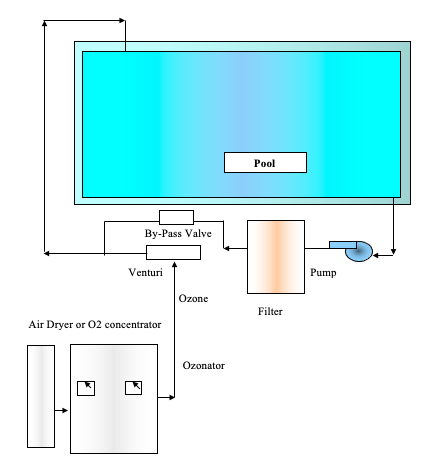 No red eye, rashes or other chlorine-induced skin reactions (even in a combined Ozone/Chlorine system) and no chlorine smell in the pool area are typical of these systems. In fact, the red eye and rashes and skin problems indicate that a serious health problem is taking place. It is your body’s way of telling you that you’re in a toxic environment.
No red eye, rashes or other chlorine-induced skin reactions (even in a combined Ozone/Chlorine system) and no chlorine smell in the pool area are typical of these systems. In fact, the red eye and rashes and skin problems indicate that a serious health problem is taking place. It is your body’s way of telling you that you’re in a toxic environment.
Ozone is the Sanitizer of Choice as problems with chlorine systems continue to be documented, most notably the production of carcinogenic (cancer- causing) by-products called chloro-organic compounds including trihalomethanes (THMs), Ozone is becoming the sanitizer of choice for pool managers. It not only eliminates the production of these compounds, but it also increases the overall effectiveness of your entire filtration system. ‘’ In Germany, which has long set the standard for drinking water and pool water quality worldwide, Ozone systems are the sanitizer of choice. Europeans are so accustomed to the pristine environment of swimming pools without chlorine, that a group of European swimmers at the Atlanta Olympics refused to enter a chlorinated pool. The pool was subsequently switched to an Ozone treatment system.
Why Ozone? Ozone kills bacteria, viruses and protozoa such as giardia lamblia and Cryptosporidium organisms which can cause severe gastrointestinal illness and which chlorine is much less effective in killing. As well, it also prevents airborne endotoxins which occur in standard chlorine water treatment and which may be breathed in by patrons and lifeguards. These toxins can cause chronic coughing and wheezing among lifeguards called Hypersensitivity Pneumonitis. Ozone eliminates pool odors common to traditional pool systems and oxidizes and destroys oils and other contaminants in water. Not only does Ozone accomplish all of this, but it is also PH neutral and adds no contaminants to water. Ozone does not break down into irritating substances. In fact, where pools use a dual system of sanitation (i.e., Ozone and chlorine or bromines), Ozone inhibits the formation of chloro-organic byproducts and THMs.
Other benefits of Ozone include: Filtration support. Ozone assists flocculation of organic waste materials, thus enhancing the effectiveness of sand filters or other filtration systems. Water purification. Ozone directly decomposes organic waste by oxidation. Water sanitation. Properly dissolved ozone residual of .05 mg/l or higher assures a 100% kill of all bacteria, viruses and fungus. Clear Water. Unused Ozone reverts to normal Oxygen and remains dissolved in the water to the point of saturation. This makes the pool water clean, sparkling and appealing. Ozone is produced on site and does not require storage or transportation. Ozone prevents calcium carbonate scaling, removes existing scale, cleans and it also cleans and prevents greasy sediments on pool sides. Ozone treated water has a much lower cleaning cost.
The Bottom Line In commercial pools, you’ll have a much healthier environment without the aggravation of chlorinated off-gassing. In privately owned pools, you can convert to Ozone exclusively. Ozone is produced electrically so there are no on-going costs for chemicals or additives to the pool. Ozonation eliminates the outbreak of serious waterborne diseases and improves the general performance, health and quality of life for swimming pool patrons.